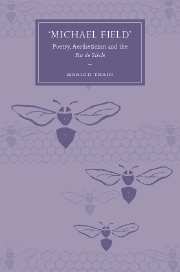Book contents
- Frontmatter
- Contents
- Acknowledgements
- Introduction: ‘something fierce, subtle, strange, singular’
- 1 The diaries and dramas: life-writing and the temporal patterns of aestheticism
- 2 Long Ago: the male pseudonym, fin-de-siècle sexualities and Sappho's historical leap
- 3 Sight and Song: Botticelli and ekphrastic paradox
- 4 Underneath the Bough: dual authorship and lyric song
- 5 Wild Honey from Various Thyme: apian aestheticism and the lyric book collection
- 6 The Catholic poetry: the spiritual and historical ‘turn’ of the century
- Conclusion: modernism and the fin de siècle
- Notes
- Bibliography of material by Katharine Bradley and Edith Cooper
- General bibliography
- Index
- CAMBRIDGE STUDIES IN NINETEENTH-CENTURY LITERATURE AND CULTURE
4 - Underneath the Bough: dual authorship and lyric song
Published online by Cambridge University Press: 08 September 2009
- Frontmatter
- Contents
- Acknowledgements
- Introduction: ‘something fierce, subtle, strange, singular’
- 1 The diaries and dramas: life-writing and the temporal patterns of aestheticism
- 2 Long Ago: the male pseudonym, fin-de-siècle sexualities and Sappho's historical leap
- 3 Sight and Song: Botticelli and ekphrastic paradox
- 4 Underneath the Bough: dual authorship and lyric song
- 5 Wild Honey from Various Thyme: apian aestheticism and the lyric book collection
- 6 The Catholic poetry: the spiritual and historical ‘turn’ of the century
- Conclusion: modernism and the fin de siècle
- Notes
- Bibliography of material by Katharine Bradley and Edith Cooper
- General bibliography
- Index
- CAMBRIDGE STUDIES IN NINETEENTH-CENTURY LITERATURE AND CULTURE
Summary
So they loved as love in twain,
Had the essence but in one,
Two distincts, division none.
Number there in love was slain.
Hearts remote, yet not asunder,
Distance and no space was seen,
’Twixt this turtle and his queen.
But in them it were a wonder.
Property was thus appalled
That the self was not the same.
Single nature's double name
Neither two nor one was called.
(William Shakespeare, ‘The Phoenix and the Turtle’)Published in 1893, Underneath the Bough, like Long Ago, was set within a context of ancient erotic lyricism. The title, and the epigraph, come from The Rubáiyát of Omar Khayyám, placing the volume firmly in the erotic mode. Underneath the Bough seems devoted to Michael Field's obsession with understanding, and figuring poetically an erotic, and lyrical, congruence between bodies across time and space. These concerns are apparent in the oeuvre before and after this volume, but here Bradley and Cooper take as their central theme the duality of Michael Field's authorship.
This chapter, then, allows me, initially, to introduce Bradley and Cooper's prose explanations of their duality, as well as the recent critical debate on this issue. In order to expand the remit of that debate, my exploration of the dual authorship will set up a comparison with contemporaneous poets which shows that the dual authorship allows Bradley and Cooper to sidestep some of the problems of subjectivity inherent in the lyric tradition for woman writers.
- Type
- Chapter
- Information
- 'Michael Field'Poetry, Aestheticism and the Fin de Siècle, pp. 90 - 129Publisher: Cambridge University PressPrint publication year: 2007



